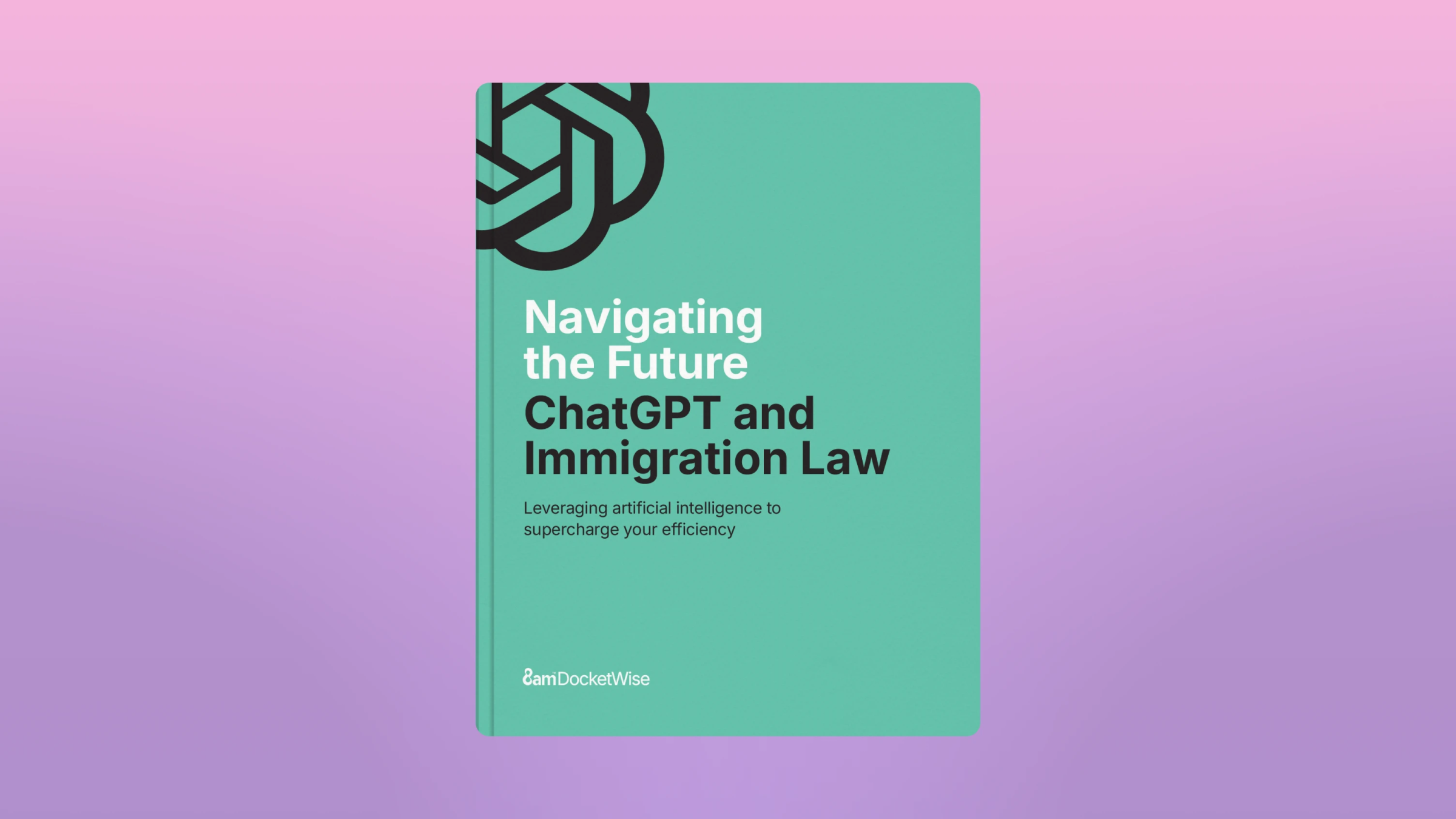Generative AI tools are changing the legal industry by boosting efficiency and sparking innovation. However, bringing these tools into legal practices needs to be done carefully, especially to keep client information safe. Without proper review, using Generative AI can come with serious risks.
Many free AI platforms may use the data you input to improve their systems, which can put client confidentiality at risk and break ethical guidelines. That’s why it’s crucial for immigration law firms to carefully review the terms and conditions of any AI tool before using it, to ensure it meets all professional and ethical standards.
For immigration lawyers, especially at smaller firms, evaluating Generative AI tools carefully is essential. Law firms like yours deal with highly sensitive client information that, if mishandled, could lead to serious legal and ethical problems. In immigration cases, personal data is often at risk, and if compromised, it could threaten a client's legal status, safety, or privacy. Smaller firms may not have the same resources as larger ones to implement strong data security, making the risks even higher. That's why it's crucial to thoroughly vet any AI tools to ensure they meet the strict confidentiality and ethical standards required in immigration law.
In this article, we'll look at four key areas law firms should review before using a Generative AI product: the End User License Agreement, Privacy Policy, Data Security Policy, and important certifications like SOC 2. These elements are essential to ensure that using Generative AI meets the strict confidentiality and ethical standards required in legal practices.
Key security areas to review when assessing Generative AI
When immigration law firms consider adding Generative AI tools to their practice, it's important to pay close attention to detail to make sure these tools meet professional and legal requirements. By carefully evaluating security and privacy factors, law firms can confidently adopt AI tools that enhance their operations while upholding the highest ethical and legal standards.
End User License Agreement (EULA)
The End User License Agreement (EULA) for Generative AI tools specifically outlines how the tool handles the data provided by users, which is key to understanding its impact on client confidentiality and legal obligations. Law firms need to check if the EULA allows the AI provider to use this data for things like model training, as this could greatly affect how sensitive information is managed.
The EULA is also important because it helps determine who owns the data entered into the AI system, ensuring that immigration law firms keep control over their client information. The agreement should clearly explain liability issues, detailing what happens if the AI tool mishandles data or there’s a breach. Understanding these terms is essential for helping law firms avoid and manage potential legal problems, ensuring their operations are protected by the EULA.
Privacy Policy
A strong Privacy Policy is crucial for any AI tool used by immigration law firms because it protects user data and ensures compliance with data protection laws. The policy should clearly state what types of data are collected, such as metadata, user inputs, or other sensitive information, and explain how that data is stored. Knowing what data is collected and how it's managed is key to identifying risks to client confidentiality and ensuring the firm’s practices meet legal standards.
The Privacy Policy should clearly explain whether and how data is shared with outside parties. Transparency about data-sharing practices is crucial for maintaining client trust and staying legally compliant. Law firms should also carefully review the policy's data retention terms to ensure they meet legal requirements and client expectations, including options for deleting data. Taking this thorough approach helps protect the firm from regulatory issues and keeps sensitive client information secure.
Data Security Policy
A strong Data Security Policy is crucial for protecting sensitive information from unauthorized access and potential breaches in law firms. It's important to closely examine the technical and organizational safeguards the company uses, like strong encryption, secure server setups, and regular security audits. These measures are essential for keeping data safe and ensuring that sensitive client information remains protected from risks and vulnerabilities.
It's crucial to understand the company's breach response plan, which involves evaluating how quickly and effectively they respond to data breaches and how they communicate with those affected. A clear and well-executed plan is essential for minimizing damage quickly and maintaining trust with clients and stakeholders. Being prepared in this way is key to managing security incidents efficiently and reducing their impact.
Certifications
Certifications like SOC 2 are important because they show a company’s commitment to data security and industry best practices. For immigration law firms considering an AI tool, SOC 2 compliance indicates that the provider has strong security protocols and controls in place. These certifications reassure law firms that the provider meets high security standards.
Along with SOC 2, certifications like ISO/IEC 27001 set a high standard for data protection, showing that the AI provider is dedicated to keeping data safe. Law firms should also review any available audit reports, which offer detailed information about the provider's security practices and compliance, giving a clearer picture of their overall security and operations.
The importance of assessing Generative AI and exploring its non-legal applications
For immigration lawyers, especially those in small firms, thoroughly reviewing these key security areas is essential. Immigration cases involve highly sensitive personal information, and mishandling this data could have serious consequences for clients, including risks to their legal status or privacy. By carefully examining the EULA, Privacy Policy, Data Security Policy, and Certifications of any Generative AI tool, immigration lawyers can ensure the technology they use meets the highest standards of confidentiality and ethics. This careful review is crucial for protecting client information, staying within legal boundaries, and safeguarding the firm’s reputation and operations.
While it's important to protect sensitive client information, immigration law firms can still take advantage of Generative AI for tasks that don't involve confidential data. When used strategically, AI can greatly improve a firm's efficiency and outreach, providing valuable help with non-sensitive tasks like marketing and content creation.
Generative AI tools can improve online presence, boost client engagement, and increase efficiency by automating routine tasks, allowing lawyers to focus on strategic work and client interactions. This use of AI shows how it can transform legal practices by enhancing creativity and strengthening client relationships.
Docketwise AI tools build for Immigration lawyers
Interested in learning more about how you can optimize your immigration law practice with AI? Docketwise is currently developing AI tools to transform immigration law firms with features such as intelligent immigration form completion, document summary, and text editing. Join the waitlist today and learn more!
And check-out the official Docketwise podcast, "Immigration Uncovered," and don't forget to subscribe to "Immigration Insights," a quick five-minute newsletter that keeps thousands of immigration lawyers informed and up-to-date!
Transform Your Practice with ChatGPT
Discover how AI, particularly ChatGPT, can revolutionize your practice, from automating tasks to mastering effective prompting.
Download Now
About the author
James E. Pittman is a distinguished immigration attorney, co-founder of DocketWise, and Director and Subject Matter Expert (SME) in immigration at Docketwise, a leading platform delivering purpose-built solutions for legal and accounting professionals. A former patent attorney, he later built a highly regarded U.S. immigration practice and is a sought-after CLE educator on immigration law and ethics. James is admitted in NY, NJ, before the USPTO, and hosts the DocketWise video podcast Immigration Uncovered.

